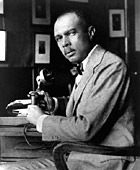Most modern Americans do not know the words to "Lift Every Voice and Sing," (see below) but in the segregated schools of the 1920's, black students would rise every morning and sing this "Negro National Anthem" written by James Weldon Johnson. Born in Jacksonville, Florida in 1871, Johnson grew up headstrong, willful, and courageous. Attending Atlanta University where he studied English literature and European music tradition, Johnson intended to use his education for the advancement of his race.
While a freshman in college, Johnson took a trip throughout the rural South, igniting his interest in the African American folk tradition. Later he would incorporate the rhythms and ideals of these traditions in his uniquely beautiful poetry. After graduating from the University, Johnson first became a high school principal; then in 1906, he accepted the position of U.S. Consul in Venezuela and later in Nicaragua. While overseas, Johnson had several poems published in the United States.
In 1912, James published anonymously his novel, The Autobiography of an Ex-Colored Man. This novel tells the story of a mulatto giving up his racial roots for the comfort of being a mediocre, middle-class white person. The book is very interesting reading, because it explores the themes of racial roots, racial values, and moral choices.
In 1920, Johnson became the national organizer for the NAACP and was the organization's first executive secretary. Later, in 1922, Johnson edited his Book of American Negro Poetry, a major contribution to African American Literature. The 1920s were a time of great change for the United States. The "Great Migration" brought thousands of blacks from the South to the industrialized North. The increase in educational and employment opportunities for African Americans after the War for Southern Independence, combined with the development of a black middle class, created an atmosphere conducive to a cultural renaissance. In New York City, Harlem became the political and cultural center of black America and thus the center of the "Harlem Renaissance"--a movement lasting a little more than a decade where the African American voice began to be heard and appreciated in the fields of music, theatre, and literature. James Weldon Johnson was the "elder statesman" of the Harlem Renaissance.
The 1926 publication of Nigger Heaven by Carl Van Vechten showed the glitzy, glamorous, and guttural sides of Harlem. While it offended some African Americans, the book also perpetuated the mystique of the Harlem Renaissance by creating what was known as "Negro vogue." The main problem facing the black artist during this time according to Langston Hughes (also a Harlem Renaissance poet) was "the pressure, often found in the black middle class, to strive for whiteness."
In 1927, Johnson published God's Trombones, a book of poetry which celebrated the rhythms which had first captivated him on his teenage tour of the rural South. Interestingly, Langston Hughes' book of poetry was called Tambourines to Glory. The musical allusions in both titles illustrate the essence of the African American heritage. In the words of Langston Hughes, the heritage is one of "rhythm and warmth incongruous humor that so often as in the Blues, becomes ironic laughter mixed with tears." Truly, James Weldon Johnson promoted and preserved that laughter mixed with tears.
In 1938, while a professor at Fisk University, James Weldon Johnson was killed in an automobile accident. |






